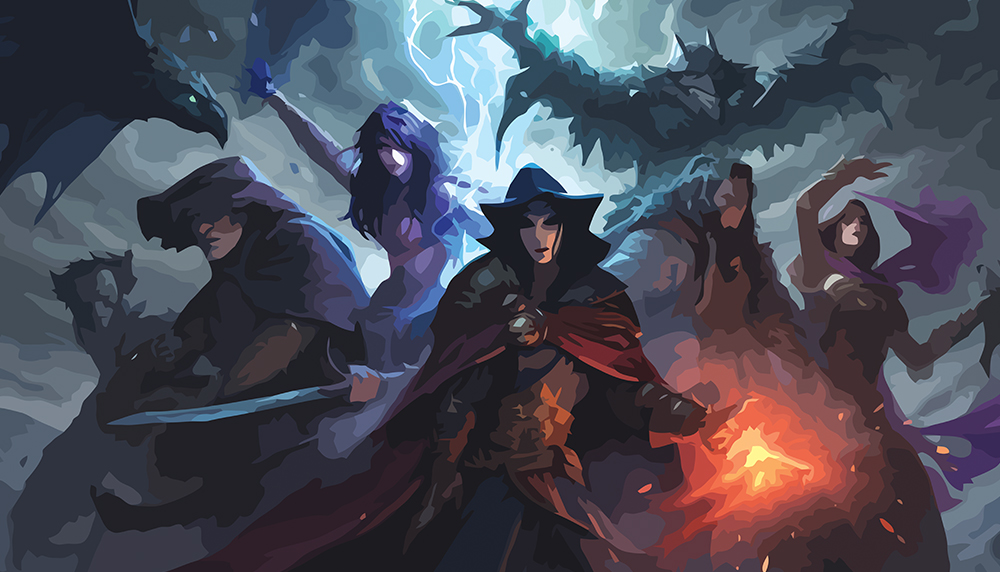Choose Your Own Adventure — And Choose Well
When it comes to navigating our Volatile, Uncertain, Complex and Ambiguous (VUCA) world, it is vital to reflect on our goals and values — and having a roleplaying game mindset might help too, says Dr Adrian W J Kuah.

If I had a dollar for every time I heard “VUCA” uttered in a keynote speech or commencement address, or saw it in some journal article or op‑ed… I, for one, struggle to find anything novel to say about this topic beyond the usual platitudes of resilience and agility and lifelong learning and so on. What I’d like to do instead is to unpack the metaphor of “navigating” a VUCA world and how it shapes your personal myths and narratives as you go out into it.
CHART A COURSE
Let’s start with the word “navigate”. It derives from the Latin
nāvigō, which in turn comes from two roots —
nāvis, which means “ship”; and
agō, a verb that means “to do” or “to go”. The word “navigate” conjures imagery of oceans, ships and sailors. It suggests maps, compasses, telescopes, octants and sextants, the instruments required to navigate a ship. At its most fundamental level, “to navigate” implies intention, purpose, direction and destination.
Destination, insofar as it speaks of intention and aspiration, reflects our values. What is it about that place, that we believe we will find treasures and all things good there? Are we navigating, or are we just trying to stay afloat? Because if we don’t know where we are headed, then we are not navigating. We are just trying not to sink.
Now, the survival imperative is not to be taken lightly. If we can’t even survive the shark-infested waters we find ourselves in, then any talk about distant horizons and treasure islands is moot. If you take the Singapore story, it is fashionable to portray it as one of survival and pragmatism. But let’s not forget that there was idealism and optimism involved. While we needed to survive the short-term risks, our predecessors had a clear idea of where they wanted to head towards.
Fast forward to our time. We are still learning to live with COVID-19. The global order seems to be fracturing. War is very much with us. There is the climate crisis, inflation, food and supply chain woes... the list goes on. Artificial intelligence is as much a source of promise as it is a cause of anxiety and distress. Amid all this, you might say that the only order of business is simply to survive. Just tread water. Don’t drown. I disagree. Existential crises, all the more, should cause us to ask existential questions. What is all this about? Why are we doing this? After all, what better motivation is there to survive, than the prospect of some worthy destination at the end of our struggle?
 A Dungeons & Dragons character sheet, which lists the player’s attributes, experience and possessions.
A Dungeons & Dragons character sheet, which lists the player’s attributes, experience and possessions.
REWRITE THE SCRIPT
Amid the volatility and complexity around us, I challenge you to articulate your myth and narrative afresh. While the body can survive without material success, the spirit will die without meaning and purpose. What would you say if I gave you the prompt, “Life is a <fill in the blanks>”? If life is a struggle, what are you struggling against? Is that struggle necessary? We all face difficulties in life. Many are inevitable. But do we also contrive some needless struggles ourselves? How do we cope? As the saying goes, pain is inevitable; suffering is up to you.
Some of these struggles come from the comparisons we make between ourselves and our peers, these days amplified by social media. Are you sometimes the architect of your own misery? On the other hand, what will you do if you see people around you struggling? Will you reach out to help? Or do you see a dog-eat-dog world — a chance to step over their dead bodies to get to where you want to go?
My challenge to you is this: Make your struggle a worthy one. Those of us who study economics will recall a key concept: Scarcity. There are limited resources, so we need to allocate, make trade-offs and compete for them. We are accustomed to getting the best deal. We define the wealthy as those who have the most. But in some indigenous societies, the wealthy are those who can
give the most. More importantly, there is a shift in mindset from transaction to relation. In a relational mode of thinking, there is reciprocity. A gift meaningfully made to you makes you want to reciprocate. A gift, in contrast to a resource, is shared. And when sharing occurs, community ensues.
![]()
If life is an adventure, are you adventuring alone? Or are you part of a band of adventurers? What are you in quest of?
The quest is up to you
My favourite metaphor is that life is an adventure. When you think of adventure, you think of both the journey and the destination. If life is an adventure, are you adventuring alone? Or are you part of a band of adventurers? What are you in quest of? Some of us have a grand plan, and that’s awesome. For others, life is a series of mini-adventures. Whether big or small, that quest makes you want to wake up in the morning, raring to go.
But there are questions to consider. Can you really go it alone? Does your crew have the requisite diversity? Because I used to play
Dungeons and Dragons (the table-top, pencil-and-paper version), I learnt that if your party is entirely comprised of warriors — but without clerics who heal or bards who inspire — you’re in trouble. If it’s made up of only bards and wizards — but no fighters — you will all be clubbed to death when the ogres come.
Finally, take a look at your character sheet. See what you’re endowed with — your genetic and socio-economic inheritance — and what you earn, cultivate and accumulate. Look at the basic attributes: Strength, intelligence, dexterity, constitution, charisma and wisdom. As a society, we prize strength and intelligence. Lately, we’ve come to prioritise dexterity too, with talk about agility, flexibility and so on. We tend to take constitution, or health, for granted and regard the other stats as “dump stats”. This is reflected in the types of heroes we valorise: Strong, powerful, often exhibiting “masculine” traits.
But that’s not the only way to lead. How will you lead, especially in a fracturing world that increasingly needs healing and community-building? What skills will you develop? Much of education still comprises knowledge content accumulation. What about the meta-skills — the skills that develop more skills?
The character sheet is an accurate metaphor for our reality: The emphasis on attributes and things that can be measured — how many “gold pieces” and “magic items” you have and so on. These things still matter. But let’s not forget that it’s called a character sheet. Where is “character” in all of this? Character will ultimately determine the why, the how, and the where of navigation.
Dr Adrian W J Kuah is the Director, Futures Office, Office of the President, at NUS.
![]()